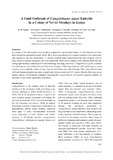| dc.description.abstract | In a group of 50 wild-caught vervet monkeys trapped for experimental studies, 23 developed severe diar-rhoea during the quarantine period. While 10 of these responded well to routine treatment with metronida-zole, kaomycin and oral electrolytes, 13 initially showed slight improvement but later relapsed. Five of these failed to respond altogether and were euthanised. Fresh faecal samples were collected from the sur-viving eight monkeys and analysed for microbiology and drug sensitivity. Campylobacter jejuni, sensitive to erythromycin, was isolated from all the faecal samples. Following treatment with erythromycin, seven monkeys recovered fully within ten days but one died before the end of therapy. This study indicates that wild non-human primates may play a significant role as a reservoir of C. jejuni, whereby they may act as natural carriers of this human pathogen. Screening for Campylobactersp in newly acquired monkeys is advisable as part of the quarantine procedures. | en_US |

